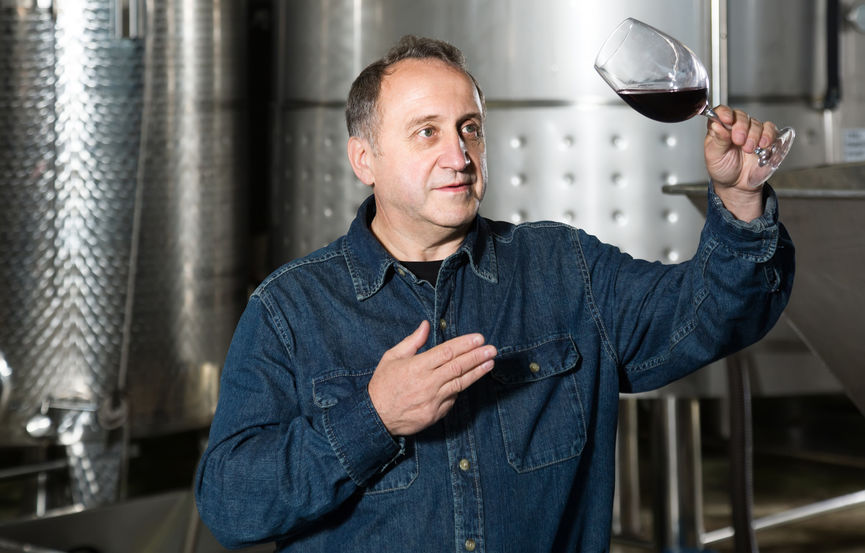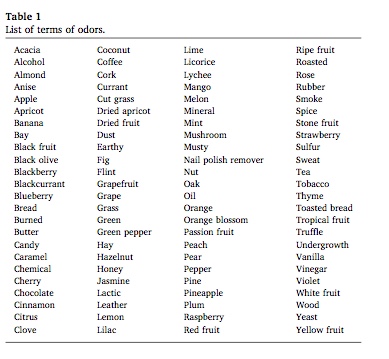Do experts categorize words to describe wine similarly to non-experts?
Seeking wine reviews from experts or from social apps?
The words to describe wine aroma experts use seem to bring them either admiration or criticism.
Although experts use words to describe wine fluently and precisely, we often have difficulty matching the expert review with the wine being described.

The influence of wine experts pushed a generation of wine lovers to believe they had to gain extensive wine knowledge to speak the same expert language.
However, a new generation now seeks wine reviews written by people like them and shared through mobile social applications. The wisdom of the crowd provides then guidance on the most famous wines and wine descriptions.
Many people argue that wine lovers using these apps only express whether they like or do not like the wine. Their words to describe wine are also less specific or meaningful than experts' words to describe wine.
Do these two types of wine reviews convey similar meaning of the words
they use to describe the wines?
Tools like the Wine Aroma Wheel facilitate the task of describing wine aroma by categorizing the sensations from generic categories to specific terms.
But you may wonder:
- Is this categorization relevant only to wine experts?
- Do non-experts group wine aromas similarly? For example, does the smell of coconut belongs to a tropical fruit category or a woody category?
Once again, scientists got up to the challenge.
A group of French researchers investigated if expertise affected the way people categorize wine odors [1].
A study on categorization of words to describe wine aroma
96 words to sort in groups of similar odors
The researchers scanned 200 publications, including wine descriptions, to build a list of the most frequently used wine aromas. They filtered down the first list of 604 terms to 96 words.
Then they invited 156 people drinking wine, from occasionally to frequently, to take part in a study. Participants first took a wine knowledge test, which split the group into four clusters of expertise: novices, intermediates, connoisseurs, and experts.
Each participant performed a simple task: To read 96 cards displaying each one wine odor (e.g., "the odor of coconut") and group the cards based on odors similarity. They could make as many groups as they wanted and could exclude odor terms they didn't know.

Data showed more agreement than expected among participants
Researchers analyzed the data and found that the number of odor groups didn't vary much among the participants' four clusters. However, connoisseurs and experts tended to make large groups of wine odors, and novices and intermediates made instead of a lot of small groups. Nonetheless, the level of wine expertise didn't impact the complexity of the odor groupings.
It seems that there was an agreement in the way the four clusters of participants grouped the wine odors.
When researchers compared the expert and novice clusters, more differences in word grouping emerged. They differed in the way they grouped 53 wine odors. The main finding is that experts categorized some terms based on their technical knowledge and less based on the odor similarities.
Examples of a few disagreements
- Coconut belonged with other tropical fruits for novices but stood alone for experts.
- White fruit was an unknown odor to novices, but experts associated it with pear, apple, and grape odors.
- Experts grouped English candy and banana as often these odors are characteristics of wines made by carbonic maceration.

- Novices grouped Hay with other Green notes such as green grass or green bell pepper, while experts grouped Hay with Tobacco. The thought is that the novice cluster associated the odor of tobacco with cigarettes. In contrast, experts matched it with Dried herbs/Hay.
- Novices grouped the odor of Yeast with toasted bread. In contrast, experts grouped it with lactic terms. The yeast aroma is often a result of primary or secondary fermentation.
The few differences observed between the expert and novice clusters came from the technical knowledge experts used to categorize terms.
In these instances, they based their grouping on the wine aroma's winemaking origin rather than on the aroma source-object.
However, for most wine odors, participants agreed to group them based on the odorant-source objects rather than the odorant-source during the winemaking process.
This finding should reassure wine enthusiasts that their words to describe wine are as meaningful as experts' ones.
As expected, wine experts use their technical knowledge to judge wine quality. In contrast, most of us use our senses to appreciate the wine overall. It is these few instances that can confuse non-experts when they don't perceive what the expert does.
How are grouped the terms of the Wine Aroma Wheel?
Dr. Noble shared recently with my students and me that the terms had been grouped for the most part based on the odorant-source objects. However, we can see on the wheel some examples of words grouped according to their winemaking origins.
When practicing wine aroma description, using the Wine Aroma Wheel also helps us learn the aroma terms issued from the winemaking process.
Published January 20, 2021
Reference
L. Koenig, C. Coulon-Leroy, R. Symoneaux, V. Cariou, E. Vigneau, Influence of expertise on semantic categorization of wine odors, Food Quality and Preference, Volume 83, 2020, 103923.


New! Comments
Have your say about what you just read! Leave me a comment in the box below.